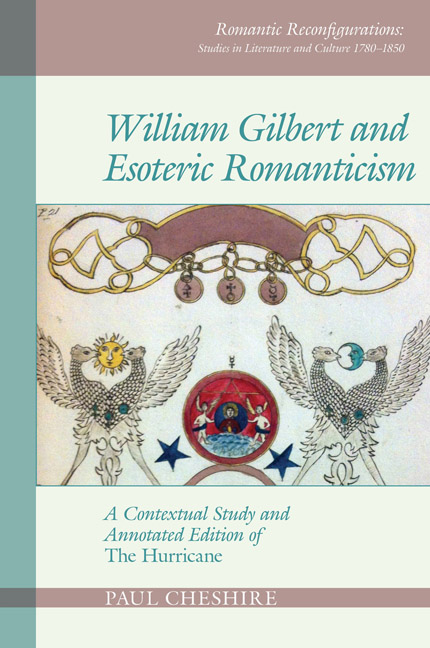 William Gilbert and Esoteric Romanticism
William Gilbert and Esoteric Romanticism from Part Three - Conclusion
I know, that nothing is done towards enlightening the world at large, till the Esoteric overwhelms the Exoteric.
(HN §105)Gilbert's ‘lonesome pilgrimage’
Over the decade from 1788 to 1798 Gilbert passed through three very different groups: Methodists, occultists, and Romantics. In The Hurricane he called this a ‘lonesome pilgrimage’ (HN §108), but, however isolated he may have felt, he was clearly interacting with and being influenced by the groups he encountered. In 1788 he had a spiritual crisis caused by the Christian sense of sin that was a chief feature of the Methodism in which he was raised. Methodists regarded ‘conviction of sin’ as a necessary prerequisite for salvation, and expected it to be followed by true repentance and an assurance of forgiveness and redemption by Christ. As we have seen in chapter 1, Gilbert was not the only Methodist to require treatment in an asylum after getting stuck in this state of selfcondemnation. He referred back to this experience in The Conjuror's Magazine, writing ‘Conscience is a more severe revenger, than the most ingenious and inexorable tyrant on earth’ (CM, I: p. 389).
Gilbert recovered from his spiritual crisis by finding – with the help of John Henderson – a solution in the study of astrology and magic. It is plain from his Conjuror's Magazine articles that he regarded this radical change of direction as a further step on his pilgrimage. He declared that ‘the true magician is the true christian’ (CM, I: p. 77) and he distanced himself from the Methodists, having come to believe they had no true connection with the divine (CM, I: p. 337). He thus arrived at a broader ‘theosophical’ understanding of Christianity that was informed by Hermetic magic and astrology, as well as by the teachings of Swedenborg and the ancient Neoplatonic tradition.
On his return to Bristol in 1795 he met a circle of young poets, the Romantics, who – among other revolutionary ideas – were crediting nature as a means of spiritual renewal. However theologically problematic the pantheistic implications of this experience would later become (problems anticipated by Coleridge in ‘The Eolian Harp’), at that time they viewed exposure to nature as a means of bypassing the mystifications of priesthood to allow direct experience of the divine.
To save this book to your Kindle, first ensure no-reply@cambridge.org is added to your Approved Personal Document E-mail List under your Personal Document Settings on the Manage Your Content and Devices page of your Amazon account. Then enter the ‘name’ part of your Kindle email address below. Find out more about saving to your Kindle.
Note you can select to save to either the @free.kindle.com or @kindle.com variations. ‘@free.kindle.com’ emails are free but can only be saved to your device when it is connected to wi-fi. ‘@kindle.com’ emails can be delivered even when you are not connected to wi-fi, but note that service fees apply.
Find out more about the Kindle Personal Document Service.
To save content items to your account, please confirm that you agree to abide by our usage policies. If this is the first time you use this feature, you will be asked to authorise Cambridge Core to connect with your account. Find out more about saving content to Dropbox.
To save content items to your account, please confirm that you agree to abide by our usage policies. If this is the first time you use this feature, you will be asked to authorise Cambridge Core to connect with your account. Find out more about saving content to Google Drive.